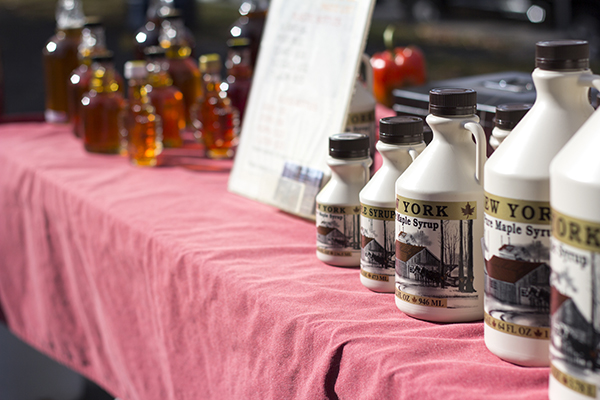

SUNY New Paltz is one of 12 SUNY campuses taking part in the collective purchase of 1,000 gallons of locally processed tomato sauce from farms in Vernon and Kingston, N.Y., as part of SUNY Chancellor Nancy Zimpher’s SUNY Commits program — a system-wide initiative to incorporate more locally grown food products on SUNY campuses.
The purchase is part of the launch of the program, which looks to include a larger expanse of New York foods and to include more SUNY campuses in future growing seasons.
SUNY New Paltz President Donald Christian said the program — as part of Zimpher’s “Power of SUNY” strategic plan — works to “take what’s happening on campuses [and] package them in ways that show a broader impact across the entire system,” and is in line with the New Paltz’ larger-scale food service aspirations.
Christian said the program, works to “take what’s happening on campuses [and] package them in ways that show a broader impact across the entire system.”
“I think the Chancellor has been very clearly committed to sustainability, and we are as well, as well as doing things that we can to help build and sustain the New York economy,” Christian said.
Christian said the school has been trying to establish connections between the college’s food service provider, Sodexo, CAS and regional food growers to seek more local opportunities in the future. He said administration has connected them with one company in Orange County that raises salmon in an “aquaculture flow-through system” that uses the waste water from the salmon to grow tomatoes hydroponically.
“We’ve connected them and I think they’ve had some early explorations but I don’t know if there’s anything concrete developing there yet,” Christian said.
However, Christian said one challenge for future local food expansion depends on the cost students are willing to pay for their food as demonstrated by a recent survey by Campus Auxilary Services (CAS).
“CAS did a survey recently that shows far greater interest among students in having locally grown foods served on the campus compared with their willingness to pay for locally grown foods,” Christian said. “I think the tipping point was a pretty good percentage of students interested in paying up to 10 percent more for food if they’re getting more locally grown food, but the idea of paying 30 percent more was not quite as positively received, which makes sense.”
Second-year sociology major Annie Courtens said students pay “a reasonable amount” for food already and that the administration should look for every opportunity to provide students with the local, organic and “good” produce.
Courtens said the key to bringing local foods to campus is educating students, which is also a component of SUNY Commits.
“The conversation has to be a student movement, students to students,” Courtens said. “It’s crucial. It’s a necessity.”
Christian said the college has had some discussions in recent years to build faculty interest in a food studies focus, a “liberal education focus dealing with history, economy, sociology, biology.”
“We have a bunch of courses that have some links to food and food studies and nutrition, but they’ve never been packaged in a way that would create a program,” Christian said. “It’s sure something the administration would support but it requires faculty initiative to try to move that along.”
Courtens said she believes the program would garner support from faculty and students alike, as the need for sustainable food is universal.
“It’s the only thing that connects every person on the planet,” Courtens said. “Food is what unites everyone around the dinner table. Everyone can talk about food. It’s such a wide, complex issue.”
